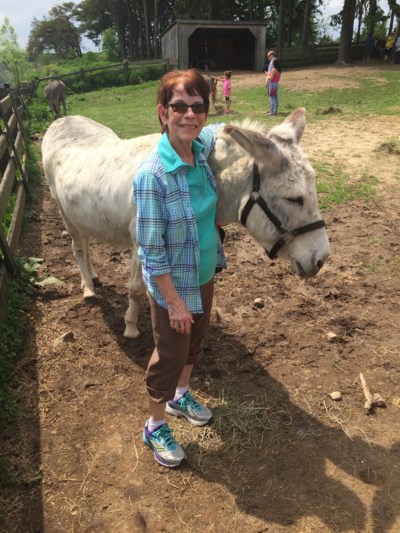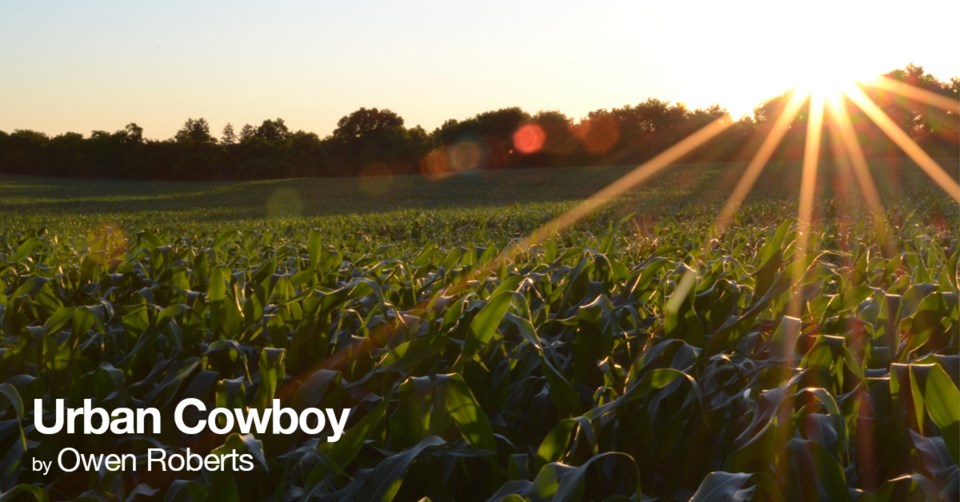Guelph doesn’t have a zoo, but just outside of town, it does have an animal preserve no other municipality in this country can claim – that is, a gorgeous 100-acre farm called the Donkey Sanctuary of Canada.
The sanctuary is holding its 23rd annual Donkey Day open house this Sunday from 10 a.m. – 2 p.m.. To me, it’s worth the price of admission ($15 for adults, $10 for seniors and students, $5 for kids) to see what’s going on up the lane and across the pond on this idyllic property, on the donkeys’ special day (see Sunday’s program here).
You’ll see about 90 donkeys, mules (a male donkey-female horse cross) and hinnies (a male horse-female donkey cross) that could no longer be looked after by their owners, or were rescued from difficult or abusive environments. This year, the sanctuary is expanding with land next door, to accommodate more animals.
 Linda Cox and Johnny at Donkey Sanctuary of Canada May 2016 photo by John Roberts
Linda Cox and Johnny at Donkey Sanctuary of Canada May 2016 photo by John RobertsOn working farms, donkeys are sometimes kept as guard animals, to frighten away predators of sheep and cattle. Normally, donkeys are quite calm. But when the likes of dogs or coyotes are threatening a herd they’ve become associated with, donkeys get defensive and do what they can – kick, bite, bray – to chase the predator away.
It’s not unusual for donkeys to live to be 35 years old or more. And during that time, conditions can change significantly for their owners or keepers. That can result in some tough situations for donkeys.
Here’s how the sanctuary puts it:
“The donkey is the forgotten equine, too often a subject of ridicule, and too often as well considered disposable at the end of its working life. Donkeys are often abused and neglected, and, once no longer wanted, placed into an equine auction. Then, if a buyer is not available at the moment of sale, the animal is sold to a slaughterhouse. Whenever possible, we put an end to this inhumane cycle in which equines are bred, bought and sold over and over, and then disposed of callously. We provide a sanctuary for these animals, where they may live out their lives naturally, in peace, and without obligation to humans.”
The sanctuary is all run by charitable donations, volunteers and foster farms, the latter of which take donkeys in need of special care and rehabilitation.
Since opening its doors in 1992, the sanctuary’s good intentions have touched the hearts of thousands in Canada and abroad who, for assorted and sometimes inexplicable reasons, want to do what they can to help these storied creatures.
One such contributor is former Guelphite Linda (Laver) Cox, whose family owned Laver Groceries on the corner of Edinburgh Road and Waterloo Ave. for ages. She now lives in Hamilton, and she recalls riding her bike outside the Steel City, past a small farm where a donkey would often saunter to the fence and greet her when she approached.
“We’d just look at each other . . . he was beautifully still, with such kind eyes,” she says. “There’s some gentle connection with donkeys that I can’t explain, and neither can others that I’ve spoken to, but it’s there.”
The sanctuary is in the third year of a four-year strategic plan that saw its mission expand to include promoting the responsible stewardship of all animals through humane education. That’s consistent with the growing movement towards improved animal welfare for all species, led locally, nationally and globally in theoretical and applied research circles by the University of Guelph’s Campbell Centre for the Study of Animal Welfare. At a recent animal welfare forum at the university, challenges facing species from domestic livestock to tigers in zoos were on the table.
Learn about the challenges facing donkeys yourself this Sunday. If you can’t make it then, the sanctuary is open every Sunday from now until October.
